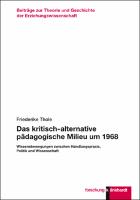Das kritisch-alternative pädagogische Milieu um 1968
Wissensbewegungen zwischen Handlungspraxis, Politik und Wissenschaft
Abstract
The late 1960s can be described as a time of democratic awakening and social upheaval, also regarding discussions on education. Taking this period of critique and questioning as a starting point, the work proceeds to examine knowledge movements. Knowledge circulation and knowledge transformation processes between political and educational practice as well as educational theory are analysed on the basis of 9 biographical narratives of people who were active in educational or political practice projects around 1968. The first theoretical part of this thesis outlines the historical context and introduces the state of research on '1968 and pedagogy'. Subsequently, the thesis introduces its knowledge-historical theoretical approaches, from which the concept of knowledge movements developed for this thesis emerges. The first part of the thesis concludes with the presentation of the methodical and methodological premises, explains theoretically the applied procedure of an integrative coupling of discourses and biographies and shows the form of practical application in the work. The second part of the thesis includes the presentation of the empirical results and along inductively identified thematic strands, various aspects of new perspectives that can be considered as (co-)inspired/stimulated by the critical-alternative pedagogical milieu that are examined in greater detail. The third part of the paper presents the results and links them back to the theoretical premises. Thus, it is shown how knowledge of the discursive space of the critical-alternative pedagogical milieu changed through its discursive entanglements with the established educational science and how the established educational science entered a communicative process of opening through the confrontation with the new forms of knowledge. For educational science, the results and documented processes can thus can thus serve as a sample for contemplation and be referred to introspectively in the context of today's processes of theory formation or research. Disciplinary continuities and discontinuities were shown and hence it is possible to revise/identify trends or demarcations via the knowledge-historical findings of the work. Die späten 1960er Jahre können als eine Zeit des demokratischen Aufbruchs und des gesellschaftlichen Umschwungs, auch bezogen auf die Thematisierungen von Bildung und Erziehung, bezeichnet werden. Diesem Zeitraum der Kritik und des Infragestellens als Ausgangspunkt nehmend, knüpft die Arbeit an, um Wissensbewegungen zu untersuchen. So werden, anhand von 9 biographischen Erzählungen mit Personen, die um 1968 in pädagogischen oder politischen Praxisprojekten aktiv waren, Wissenszirkulations- und Wissentransformationsprozesse zwischen politischer und pädagogischer Praxis sowie erziehungswissenschaftlicher Theorie analysiert. Im ersten theoretischen Teil der Arbeit wird einführend zunächst der historische Kontext umrissen und der Forschungsstand zu ‚1968 und Pädagogik‘ vorgestellt. Anschließend führt die Arbeit in ihre wissensgeschichtlichen theoretischen Zugänge ein, aus denen das für diese Arbeit entworfene Konzept von Wissensbewegungen hervorgeht. Der erste Teil der Arbeit schließt mit der Vorstellung der methodologischen und methodischen Prämissen, erläutert theoretisch das angewendete Verfahren einer integrativen Kopplung von Diskursen und Biographien und zeigt die Form der praktischen Anwendung in der Arbeit auf. Der zweite Teil der Arbeit umfasst die Darstellung der empirischen Ergebnisse und entlang von induktiv identifizierten Themensträngen werden verschiedene Aspekte neuer Perspektiven, die als durch das kritisch-alternative pädagogische Milieu mit angeregt betrachtet werden können, näher in den Blick genommen. Im dritten Teil der Arbeit werden die Ergebnisse vorgestellt und an die theoretischen Prämissen rückgekoppelt. So wird dort aufgezeigt, wie Wissen des Diskursraums des kritisch-alternativen pädagogischen Milieus sich durch seine diskursiven Verschränkungen mit der etablierten Erziehungswissenschaft veränderte und sich auch die etablierte Erziehungswissenschaft über die Auseinandersetzung mit den neuen Wissensformen in einem kommunikativen Prozess der Öffnung begab. Für die Erziehungswissenschaft können die Ergebnisse und dokumentierten Prozesse somit eine Kontemplationsfolie bieten, um sich im Kontext heutiger Prozesse der Theoriebildung oder der Forschung selbstreflexiv auf diese zu beziehen. Disziplinäre Kontinuitäten und Diskontinuitäten konnten sichtbar gemacht werden und so ist es möglich über die wissensgeschichtlichen Erkenntnisse der Arbeit Trends oder Abgrenzungen gegenzulesen.
Keywords
Bildungsgeschichte; Historische Bildungsforschung; Wissenstransfer; Politik; Pädagogik; Erziehungswissenschaft; Pädagogische Praxis; Soziales Milieu; Wissen; Wissensproduktion; Alternativbewegung; Alternative Pädagogik; Kontext; Methodologie; Kritische Pädagogik; Chancengleichheit; Ungleichheit; Empirische Forschung; Achtundsechziger; 60er Jahre; 20. Jahrhundert; Biografische Methode; Dissertationsschrift; Deutschland; Deutschland-BRD; History of education; History of educational activities; Transfer of knowledge; Politics; Pedagogics; Sciences of education; Social milieu; Knowledge; Alternative movement; Methodology; Equal opportunities; Equal opportunity; Empirical research; Biographical Inventories; Doctoral Theses; Germany; Germany-FRG; German language; Growing oldDOI
10.35468/6011ISBN
97837815-25696, 9783781560116Publisher
Verlag Julius KlinkhardtPublication date and place
Bad Heilbrunn, 2023Series
Beiträge zur Theorie und Geschichte der Erziehungswissenschaft, 48Classification
Education


 Download
Download Web Shop
Web Shop